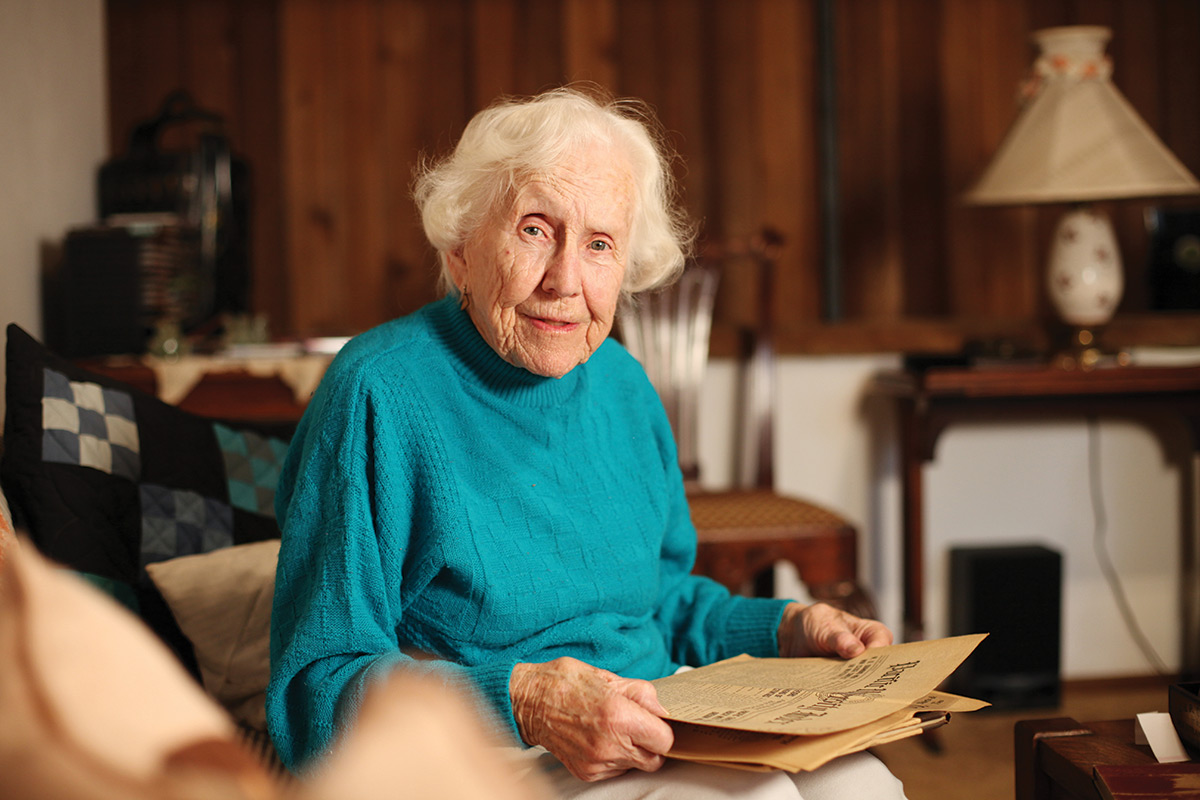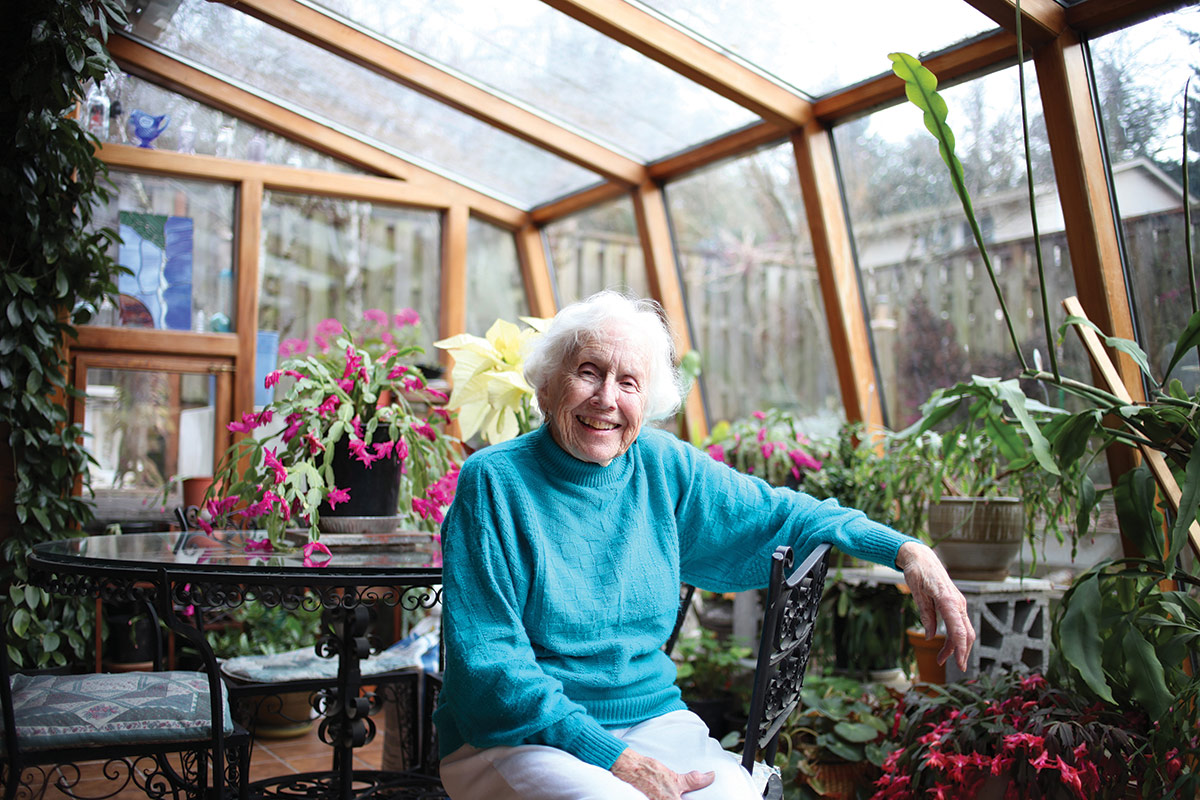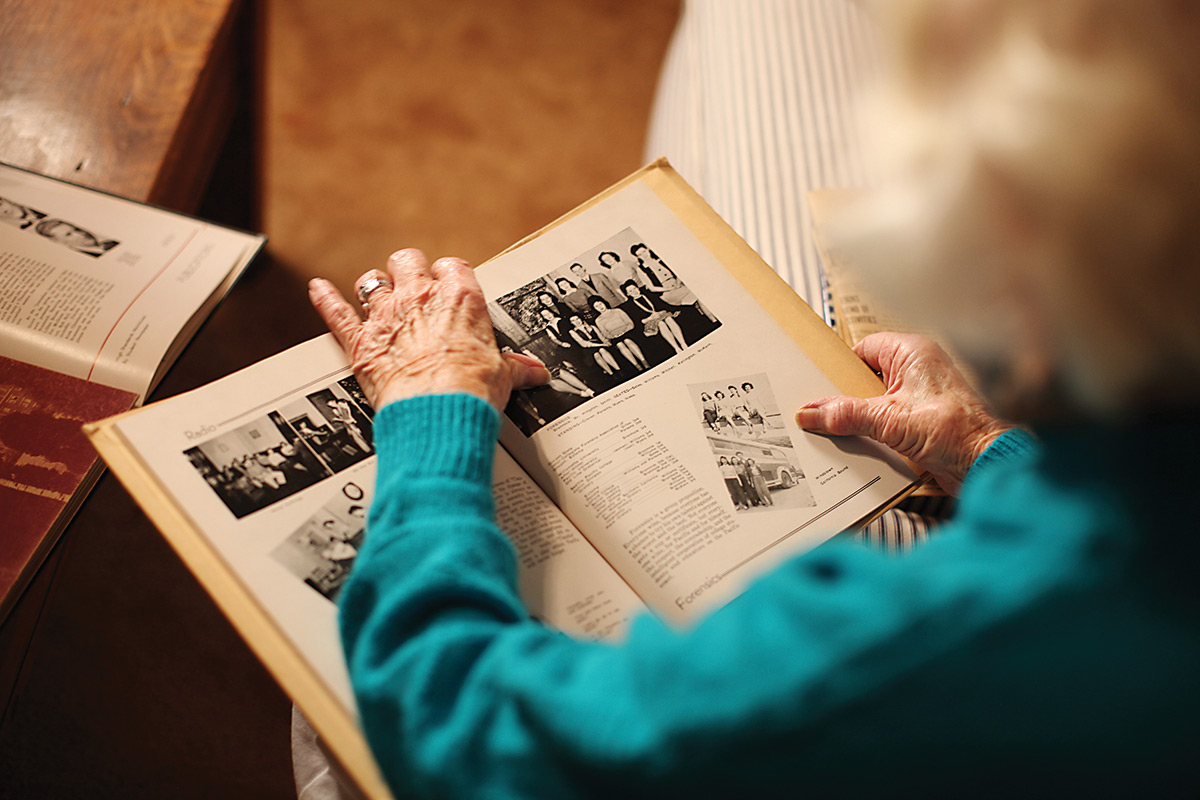
When I pull up to her Tualatin home, Del Judy ’46, MAEd ’73 is lugging boxes from her trunk to another car in the driveway.
Later, as we head inside, she sighs and says she may have pushed a little hard the previous day, with two hour-long yoga classes.
It doesn’t take long to realize that this diminutive 90-year-old woman, with her white hair and thin bifocal glasses, could, quite likely, knock me flat, if she wanted.
Luckily, she seems too sweet to do so.
Del is one of the original residents of Tualatin, moving to the now fast-growing Portland suburb in the late 1950s, when it was home to just 300 people. Today, she is a quiet community leader, working with Meals on Wheels and the local community center. In 2012, she was awarded the Outstanding Lifetime Volunteer Achievement Award by the city.
She’s also a great-grandmother, a candy-maker, a teacher, an adventurer — and a proud Pacific University alumna.
Del — that’s short for Delilah — was Del Wheeler when she first came to Pacific University.
Born in Kansas, her family had moved west when she was a child, buying land and building a house near where the Pacific University Abbott Alumni Center now sits.
“See how close I was to Pacific?” she said. “I didn’t know I was going to be living there.”
It was 1941 when she started school, and the United States would soon be entering World War II. At the time, though, she didn’t know the country was on the brink of war. She just knew that, with a music scholarship supplementing her tuition, she had a golden opportunity before her.
“I was the first in my parents’ family to go to college,” she said. “Pacific gave me such an opportunity.”
She lived off-campus as a freshman, then in Herrick Hall her sophomore year. When she was a junior, the university turned MacCormick Hall co-ed (rare at the time, of course), because the war had taken so many men from campus.
“They told us, since we were good girls, we’d be allowed to move into Mac Hall,” Del recalled. “They’d partitioned it with a malleable wall, but it wasn’t two weeks before the boys cut a hole in it. We had great fun.”
All above board, though, as the housemother lived just under Del’s dorm room.

It was at Pacific University that she met her future husband, Clayton Judy. After she graduated with a degree in speech and drama, they married, and she spent the next several years as a dedicated wife and mother.
“He was the kind of man who enjoyed having his wife at home,” she said.
Together, they bought six acres in Tualatin, a small farm where their family could grow.
“I thought I’d died and gone to heaven,” Del said.
Her father, an old Kansas farmer, thought they were crazy. Her oldest daughter, then in sixth grade, thought the new rural setting would be her “ruination.”
But, that was the beginning of the family’s life in Tualatin. Over the years, Del has watched it grow from a community of 300, where her children rode horses next to what is now I-5, to more than 26,000. Soon, the community will celebrate its centennial, and Del has been asked to join some other early residents in writing down memories for a time capsule.
“There aren’t many of us who have been here that long,” she said, chuckling. “It will be interesting to see who can come up with the biggest lie.”
Del serves takeout lunch on real plates with cloth napkins. There are candles on the table and glassware in a hutch in the small dining room. The house is a mishmash of formal and casual — the home of a woman who’s tidy, but not fussy, who likes her things but doesn’t sit at home much.
A wood stove churns out waves of heat that keep the house warm on a cold day. In the back, a sunroom is filled with thriving plants, including a soon-to-bloom bird of paradise. The small backyard attracts avian visitors with big trees hung with bird feeders.
It’s not the house she shared with Clayton, but it’s on the same property. The original farmhouse still stands, but Del divided the land years ago, putting up several houses that have turned into a small subdivision.
She moved into hers about 1980 — though her transition from farmhouse wife and mother started earlier with a coincidental meeting at the airport.
“It was one of these happenstances that you later wonder, ‘Why?’” Del said.
She and Clayton were dropping their daughter off at the airport, when they ran into Fred Scheller ’43, MA ’54.
Del had been considering going back to school, and Fred told her about a new program starting at Pacific, one in deaf education.
“I immediately put it out of my mind, but my husband picked up on it and encouraged me to call,” she said.
She waffled. Her parents had moved to the farm, and she was caring for them, but her kids were mostly grown.
“My husband said I should look into it,” she said.
She did, and when a student dropped out of the program, she was given the spot. Soon thereafter, both her parents passed away.
“My father died on Sept. 15, and my mother died on Sept. 16,” she said. “It was the end of a beautiful love story. They were married more than 60 years.
“I thought, ‘I can’t do that program now,’ but my husband said, ‘Don’t you see the handwriting on the wall?’”
She continued — and a month later, Clayton was diagnosed with lung cancer. He pushed her, though, to keep going and plan for her future. Her family supported her while she studied, and Clayton moved with her when she got a job teaching in Grants Pass, enjoying the warmer weaather until he, too, passed away.
Soon, Del realized she needed a change.
“I could see the kids were going to mother me to death,” she said.

Then-President Jimmy Carter’s mother, Lillian Gordy Carter, had just published a book about her own experiences as a Peace Corps volunteer in her 60s, and Del was inspired.
“I talked to the kids,” she said. “’Try it,’ they said, which was good, because I had already sent the application.”
She put the farmhouse on the market, covered for other teachers during leaves, and prepared to head overseas.
Del was one of about 60 Peace Corps volunteers who trained together in San Francisco to work in Thailand. The group included maybe five volunteers who were, like her, outside the traditional volunteer demographic.
“I remember thinking 30 was old,” she said, laughing. “Now I’m 90, so 50 wasn’t old at all!”
The experience, she said, was tremendous. She remains friends with some of her fellow volunteers, and she believes the more experienced members of the group were able to provide perspective for the younger members.
She enjoyed the opportunity to live in a different part of the world and experience a new culture, and she believes the work she did made a difference for people there.
She was assigned to a demonstration school in Bangkok, one of the first of its kind in Thailand to actually teach deaf and hearing-impaired children. At the time, Del said, children who were deaf might be sent to the United States or the Philippines, but more often their families “got rid” of them, putting them to work as servants or even slaves.
The demonstration school served just 100 children, but provided an education they might not otherwise receive. Del worked with students, performed audiology screenings and taught other teachers about how to work with children with a myriad of disabilities. (She’s thrilled Pacific now offers a doctorate in audiology.)
Classes weren’t necessarily easy but she hopes they imparted something. “I taught in what I called ‘Tinglish,’ a little Thai, a little English. The teachers would tease me: ‘You speak as a first-grader.’ And I’d say, ‘I am a first-grader.’”
“They were going to go back to their village and maybe have a smattering of what deaf education or education of a handicapped child could be.”
Ten years later, Del took her daughter, who had volunteered with the Peace Corps in the Philippines, back to Bangkok to visit.
“The teachers thought that was marvelous. They thought I was an old lady at 55, and here I was in my 60s,” she said. “Oh did we party.”
Del returned to the United States in 1980, the day before Mt. St. Helens exploded, and moved into one of the houses built on the old farm.
She started looking for ways to stay active and connected with the community and was drawn to the Meals on Wheels program at the local senior center, where she’s been involved for more than 25 years now.
She helped re-name the center the Juanita Pohl Center to attract a broader audience and to reshape the kinds of activities offered there (like the yoga she so enjoys). Last year, she spearheaded the installation of raised vegetable beds at the center.
In 2012, she received Tualatin’s Outstanding Lifetime Volunteer Achievement Award, though she’s characteristically humble and a little self-deprecating about the recognition.
“I’ve outlived everyone,” she said. “Who else do they have to give it to?”
She spends a lot of time with her family, including her four children and seven grandchildren. And, she often takes time to return to Pacific University, which is still one of her homes.
“The campus looks so different. I love it out there, though. I love Pacific,” she said. “They gave me such an opportunity.”
Del Judy died in 2019 but lives on in Pacific's memory.